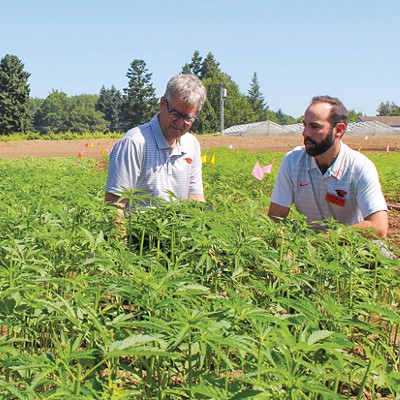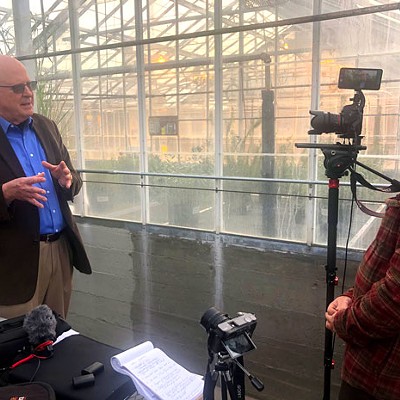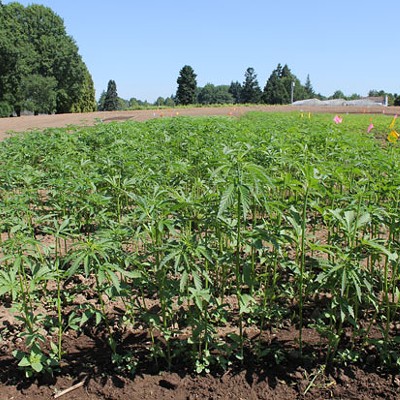For some people, farming is just part of their DNA. This is natural when one's livelihood is literally rooted to the earth. As the seasons change, a farmer's internal clock ticks in time as our planet spins and turns. This dance of life often continues for many generations, as knowledge and wisdom are passed from parents and grandparents to children.
Central Oregon has many small family farms. Undoubtedly, some will want to explore hemp as a potential option. Like other high value crops, hemp will require special attention to be grown here in the High Desert. The uncertainty of late frost in the spring, makes direct seeding a hit or miss proposition. Thus, the use of various propagation techniques and seedlings will be essential. If done right, hemp can be a niche crop that uses little water, and can be raised in a sustainable way in this area. It can become a high value crop grown on non-high value farm land.
In 2015, the Oregon Department of Agriculture sought and received a legal opinion from the Oregon Attorney General preventing the use of greenhouses, cutting, and seedlings in the production of hemp in Oregon. This would have hampered hemp in many parts of Oregon. However, the Oregon legislature stepped in during the 2016 session and passed legislation that specifically allowed the use of greenhouses, cuttings and seedlings. The legislature has sent a clear message that it wants to promote the hemp industry in Oregon.
Chances are that the ODA will have many more people seeking registration this year, including here in Central Oregon. This could become a very beneficial crop for small family farms. However, for this to occur, obtaining certified seeds in a legal manor for the farmers of Oregon would have to be a top priority for the ODA. That would require a Drug Enforcement Administration (DEA) permit. Without this, many would-be producers could be exposing themselves to federal criminal liability. Any farmers interested in producing hemp should research the issue thoroughly and contact the ODA. Hemp production is heavily regulated with many legal pitfalls. For those accustomed to the hard work, long hours and unpredictability of farming, it could fit nicely into their operations.
For most of her history, the United States was a nation of farmers. Now, fewer and fewer small family farms exist. However, the buy local, farm-to-table movements are providing more opportunities for family farms. Smaller operations have to be diversified and often have a niche crop. For many small farms in 2016, this could be hemp.
From the time European settlers starting farming on the east coast of colonial America and up until the 1930s, hemp was a major field crop in various areas of the United States.
Since 1937, commercial hemp production was banned in the United States under the guise that hemp is marijuana. In 2014, a provision in the annual Federal Farm Bill included language that allowed people to grow hemp pursuant to state hemp laws and as part of a research program with a state department of agriculture or university. By 2015, Kentucky, Tennessee, Colorado, Vermont and Oregon had hemp crops in the ground.
Oregon originally had 13 licensees in 2015. Many licensees in Oregon in 2015 did not have access to seeds and that is why many were unable to plant crops. In other states with hemp programs, the agriculture departments or universities have permits with the DEA to import certified seed for their programs. This means their producers have access to stable genetics, critical to modern hemp production, which requires crops to have less than .3 percent of THC.
The Oregon Department of Agriculture did not get a DEA permit to import certified seeds in 2015 and they are not going to do so in 2016. The DEA still considers hemp and viable seeds to be marijuana. Therefore, without a DEA import permit, producers are not allowed under federal law to import seeds from either foreign countries or other states.
Breeding cannabis is a science, especially with regard to altering cannabinoid levels to minute amounts. It often takes many years to develop stable, certifiable seeds of dioecious plants. Genetic drift, especially regarding cannabinoid levels, is very frequent in the first few generations of progeny. This could lead to serious issues for producers such as embargos or criminal prosecution.
Michael Hughes lives outside of Bend with his wife Krissy. They are developing their farming operation in Deschutes County. He was one of a handful of producers in the state able to plant and harvest hemp in 2015. Hughes is an attorney and farmer with over 20 years of cannabis production and breeding experience. He grew up on a farm in Nebraska and has studied hemp his entire life. His family has a long history of hemp production that predates the Civil War.





















